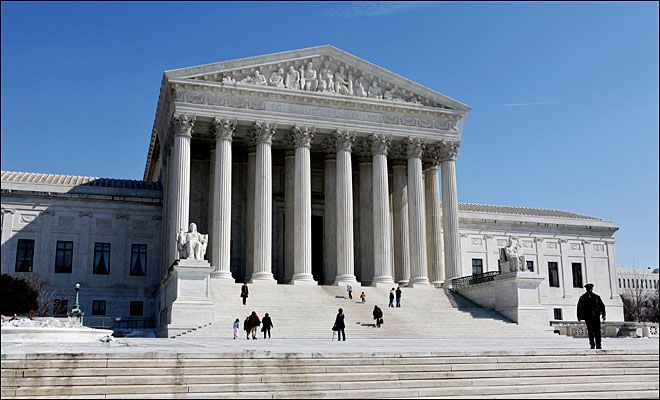SCOTUS Watch …

All eyes turn to the court
~
Until the term ends on June 30, the Supreme Court will be releasing opinions on Monday and Thursday mornings. SCOTUSblog will liveblog here today starting at 9:45 Eastern.
SCOTUSblog: October 2013 Term, major cases pending
McCullen v. Coakley, No. 12-1168 [Arg: 1.15.2014 Trans./Aud.]
Issue(s): (1) Whether the First Circuit erred in upholding Massachusetts’s selective exclusion law – which makes it a crime for speakers other than clinic “employees or agents . . . acting within the scope of their employment” to “enter or remain on a public way or sidewalk” within thirty-five feet of an entrance, exit, or driveway of “a reproductive health care facility” – under the First and Fourteenth Amendments, on its face and as applied to petitioners; (2) whether, if Hill v. Colorado permits enforcement of this law, Hill should be limited or overruled.
~
National Labor Relations Board v. Noel Canning, No. 12-1281 [Arg: 1.13.2014 Trans./Aud.]
Issue(s): (1) Whether the President’s recess-appointment power may be exercised during a recess that occurs within a session of the Senate, or is instead limited to recesses that occur between enumerated sessions of the Senate; (2) whether the President’s recess-appointment power may be exercised to fill vacancies that exist during a recess, or is instead limited to vacancies that first arose during that recess; and (3) whether the President’s recess-appointment power may be exercised when the Senate is convening every three days in pro forma sessions.
~
Conestoga Wood Specialties Corp. v. Sebelius, No. 13-356 [Arg: 3.25.2014 Trans./Aud.]
Issue(s): Whether the religious owners of a family business, or their closely held, for-profit corporation, have free exercise rights that are violated by the application of the contraceptive-coverage mandate of the Affordable Care Act.
Sebelius v. Hobby Lobby Stores, No. 13-354 [Arg: 3.25.2014 Trans.]
Issue(s): Whether the Religious Freedom Restoration Act of 1993 (RFRA), 42 U.S.C. §§ 2000bb et seq., which provides that the government “shall not substantially burden a person’s exercise of religion” unless that burden is the least restrictive means to further a compelling governmental interest, allows a for-profit corporation to deny its employees the health coverage of contraceptives to which the employees are otherwise entitled by federal law, based on the religious objections of the corporation’s owners.
~
Riley v. California, No. 13-132 [Arg: 4.29.2014 Trans.]
Issue(s): Whether evidence admitted at petitioner’s trial was obtained in a search of petitioner’s cell phone that violated petitioner’s Fourth Amendment rights.
~
More news …


 narrated by Rachel Maddow, which laid out for us all how the Iraq war was sold to the American public. I had to watch this show, not to help me make more sense of a war that has deeply and probably permanently affected/afflicted me, but to fill in some of the blanks, and there are many, because I was very disinterested in politics at the time I was deployed. I was just a happy Reservist, enjoying my Microsoft career and my weekend drills (along with the special interpreter missions that occasionally sent me to France, ooh la la!).
narrated by Rachel Maddow, which laid out for us all how the Iraq war was sold to the American public. I had to watch this show, not to help me make more sense of a war that has deeply and probably permanently affected/afflicted me, but to fill in some of the blanks, and there are many, because I was very disinterested in politics at the time I was deployed. I was just a happy Reservist, enjoying my Microsoft career and my weekend drills (along with the special interpreter missions that occasionally sent me to France, ooh la la!). 